Monday Memo: Radio’s Advantage is Human
By Holland Cooke
Consultant
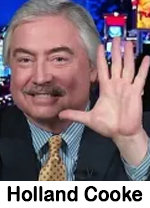 Every radio conference agenda and much of what’s-up in the trade press and chat groups is about exploiting Artificial Intelligence. Often these conversations land in one of two places: fear (“Will this replace us?”) or fascination (“Look what it can do!”). Both miss the point.
Every radio conference agenda and much of what’s-up in the trade press and chat groups is about exploiting Artificial Intelligence. Often these conversations land in one of two places: fear (“Will this replace us?”) or fascination (“Look what it can do!”). Both miss the point.
In “Between You and AI” (Wiley) author Andrea Iorio cautions that when everyone has access to the same machine intelligence, advantage shifts to what remains scarce. That’s not just-more information. It’s better judgment, trust, empathy, and local savvy… the very things radio has always done best.
Haven’t got time to read all 254 pages? Here’s a short version, as it applies to our work:
- AI is brilliant at summarizing, predicting, transcribing, drafting, and optimizing. Radio should absolutely use it to handle the mechanical work that clogs calendars and burns out staff. Show prep summaries. Promo copy drafts. Sales proposal outlines. Post-show highlights. Let the machine chew through that.
- But here’s where radio wins: what to ask, what to emphasize, what to leave out, and how to make people feel. AI can’t do those things without human direction, interpretation, and accountability.
- For a morning show: AI can surface trending topics in seconds. But it can’t know which story resonates here,today, with this audience – nor when silence, humor, or restraint is the smarter move. That’s human sensemaking. The book calls it “data sensemaking”; radio people have always called it “knowing our market.”
- News/talk: AI can summarize a city council meeting neatly. It cannot decide which exchange actually matters to listeners’ lives, nor ask the follow-up question that reframes the issue.
- Sales teams, too, are at a crossroads. AI can generate a competent proposal in seconds. So can your competitor. What it can’t do is replace the trust built when a seller truly understands a retailer’s risk tolerance, cash flow anxiety, and seasonal pressure points. As AI makes “good enough” ubiquitous, relationship quality becomes the differentiator.
- In an AI-saturated media environment, audiences won’t reward whoever publishes the most. They’ll reward whoever feels the most real. Trust will matter more than tone. Judgment more than speed. Presence more than precision.
AI is not radio’s replacement. It’s radio’s stress test. Stations that pass will be the ones that let machines handle the work so humans can handle the meaning.
Holland Cooke (HollandCooke.com) is a consultant working the intersection of broadcasting and the Internet. Follow HC on Twitter @HollandCooke and connect on LinkedIn



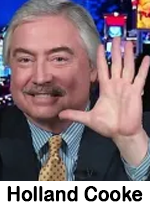 If you’re on-air, it’s an important part of your job. Here’s what I see and hear working:
If you’re on-air, it’s an important part of your job. Here’s what I see and hear working: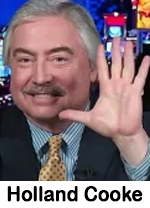 Linear broadcast media have never been more challenged. Internet video now commands far more viewing time than over-the-air TV. And their own networks are hijacking viewers! Your local NBC station tells you to watch Peacock. ABC points you to Disney+. CBS pushes Paramount+. Affiliates are effectively forced to promote their own competition.
Linear broadcast media have never been more challenged. Internet video now commands far more viewing time than over-the-air TV. And their own networks are hijacking viewers! Your local NBC station tells you to watch Peacock. ABC points you to Disney+. CBS pushes Paramount+. Affiliates are effectively forced to promote their own competition.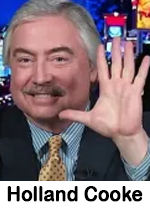 Notice how often you see one in TV commercials, even when the product has nothing to do with pets? I see spots for a local building supply outlet, in which the owner’s dog ambles through every shot, then plops down – seeming to smile – among employees in the closing shot.
Notice how often you see one in TV commercials, even when the product has nothing to do with pets? I see spots for a local building supply outlet, in which the owner’s dog ambles through every shot, then plops down – seeming to smile – among employees in the closing shot. Often, when visiting client stations, I ride shotgun on a sales call, and it’s always a masterclass. Retailers have a canny, insightful feel for their customers (our listeners). And accompanying these reps, I feel like I’m “Dancing With The Stars.”
Often, when visiting client stations, I ride shotgun on a sales call, and it’s always a masterclass. Retailers have a canny, insightful feel for their customers (our listeners). And accompanying these reps, I feel like I’m “Dancing With The Stars.” Evidence that your correspondent is a nerd: my airplane read for my CES back-N-forth was Successful AI Product Creation: A 9-Step Framework by Shub Agarwal (Wiley). If you haven’t got time for all 307 pages, here’s what I gleaned, pertinent to radio:
Evidence that your correspondent is a nerd: my airplane read for my CES back-N-forth was Successful AI Product Creation: A 9-Step Framework by Shub Agarwal (Wiley). If you haven’t got time for all 307 pages, here’s what I gleaned, pertinent to radio: Cutting edge technology is on display — and on wheels — this week here in Las Vegas.
Cutting edge technology is on display — and on wheels — this week here in Las Vegas. 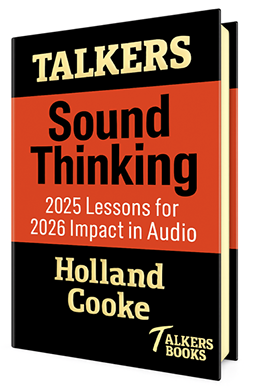 appreciate this real estate, and your feedback.
appreciate this real estate, and your feedback. At the very first CES in 1967, audio cassettes were disrupting 8-track tapes. Back to the future: Artificial Intelligence now threatens to disrupt almost everything.
At the very first CES in 1967, audio cassettes were disrupting 8-track tapes. Back to the future: Artificial Intelligence now threatens to disrupt almost everything. If you missed yesterday’s webinar, look for the replay which will be posted today at
If you missed yesterday’s webinar, look for the replay which will be posted today at  By now, a music station in your market – hopefully in your cluster – is all-Christmas-music-all-the-time, a great perennial franchise.
By now, a music station in your market – hopefully in your cluster – is all-Christmas-music-all-the-time, a great perennial franchise. Running a successful radio station, hosting a show, or producing a podcast is a lot like hosting Thanksgiving dinner. You need a plan. You need to deliver something satisfying to a crowd with varying tastes. And most of all – if you get it right – you’ll have leftovers you can turn into even more value long after the main event.
Running a successful radio station, hosting a show, or producing a podcast is a lot like hosting Thanksgiving dinner. You need a plan. You need to deliver something satisfying to a crowd with varying tastes. And most of all – if you get it right – you’ll have leftovers you can turn into even more value long after the main event.
 In an industry built on speed – breaking news, live liners, commercial deadlines – “pause” can feel like a luxury radio can’t afford. But Kevin Cashman’s The Pause Principle: Step Back to Lead Forward (Wiley) argues the opposite: pausing isn’t weakness, it’s a competitive advantage. For local radio leaders, the message couldn’t be timelier.
In an industry built on speed – breaking news, live liners, commercial deadlines – “pause” can feel like a luxury radio can’t afford. But Kevin Cashman’s The Pause Principle: Step Back to Lead Forward (Wiley) argues the opposite: pausing isn’t weakness, it’s a competitive advantage. For local radio leaders, the message couldn’t be timelier. If you’re a news/talk station, be known-for-knowing what’s happening. My client stations routinely invite tune-in “for a quick [name of network] news update, every hour, throughout your busy day.”
If you’re a news/talk station, be known-for-knowing what’s happening. My client stations routinely invite tune-in “for a quick [name of network] news update, every hour, throughout your busy day.”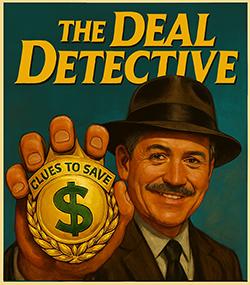 Confidence is down. Costco is mobbed.
Confidence is down. Costco is mobbed. Possibly not – beginning Sunday – unless you live in Hawaii and Arizona (except the Navajo Nation) or American Samoa, Guam, the Northern Mariana Islands, Puerto Rico, or the U.S. Virgin Islands. Everywhere else, clocks will change when we “fall-back” on November 2.
Possibly not – beginning Sunday – unless you live in Hawaii and Arizona (except the Navajo Nation) or American Samoa, Guam, the Northern Mariana Islands, Puerto Rico, or the U.S. Virgin Islands. Everywhere else, clocks will change when we “fall-back” on November 2. Microsoft CEO Steve Ballmer retired with enough do-re-mi to indulge two passions. He bought the NBA Los Angeles Clippers (for a record $2 billion). And he built
Microsoft CEO Steve Ballmer retired with enough do-re-mi to indulge two passions. He bought the NBA Los Angeles Clippers (for a record $2 billion). And he built  The most common mistake podcasters make is assuming the microphone alone creates an audience. Too many would-be hosts hit Record without a clear strategy for WHY they’re doing a show, WHO it’s for, and what makes it DIFFERENT from millions of other podcasts.
The most common mistake podcasters make is assuming the microphone alone creates an audience. Too many would-be hosts hit Record without a clear strategy for WHY they’re doing a show, WHO it’s for, and what makes it DIFFERENT from millions of other podcasts. These aren’t just bulletin boards. They’re extensions of your station, where listeners expect to be acknowledged and advertisers expect to see results.
These aren’t just bulletin boards. They’re extensions of your station, where listeners expect to be acknowledged and advertisers expect to see results. Sure, radio’s superpower is that we’re live. But 75% of all advertising dollars are now spent on digital. And Netflix, YouTube, and podcast platforms have conditioned consumers to expect that their content will wait for them (“on-demand”), not the other way around (“linear,” meaning real-time on-air). If your best content disappears the moment it airs, you’re leaking value. Think: time-shifted, searchable, and shareable.
Sure, radio’s superpower is that we’re live. But 75% of all advertising dollars are now spent on digital. And Netflix, YouTube, and podcast platforms have conditioned consumers to expect that their content will wait for them (“on-demand”), not the other way around (“linear,” meaning real-time on-air). If your best content disappears the moment it airs, you’re leaking value. Think: time-shifted, searchable, and shareable.
 Don’t let Halloween sneak-up on you. The only holiday Americans spend more for is Christmas. So – to seem more in-touch than your robotic and/or non-local audio competitors – plan something spook-tacular.
Don’t let Halloween sneak-up on you. The only holiday Americans spend more for is Christmas. So – to seem more in-touch than your robotic and/or non-local audio competitors – plan something spook-tacular. Radio programmers and sales managers know the drill: The GM drops an idea, a client makes a request, or a listener offers feedback – and the reflex is to jump straight into execution. But what if the real opportunity lies not in what’s asked for, but in what’s actually needed?
Radio programmers and sales managers know the drill: The GM drops an idea, a client makes a request, or a listener offers feedback – and the reflex is to jump straight into execution. But what if the real opportunity lies not in what’s asked for, but in what’s actually needed? My kitchen faucet wouldn’t shut off. It died, of old age. Things start doing that when your “new” house turns 25.
My kitchen faucet wouldn’t shut off. It died, of old age. Things start doing that when your “new” house turns 25. Why I love going on sales calls with station reps: Meeting retailers, who have SUCH a feel for their customers’ (our listeners’) mindset. Following-up
Why I love going on sales calls with station reps: Meeting retailers, who have SUCH a feel for their customers’ (our listeners’) mindset. Following-up
 As TV touts its perennial New Fall Season, our DVR is already set to “record series” so we can pick-up where the “Matlock” sequel left-us-hanging; and for a third season of quirky “Elsbeth” (a closet reboot, the female “Columbo”). And where I live – where everyone seems to know everyone – we are salivating for “The Real Housewives of Rhode Island.”
As TV touts its perennial New Fall Season, our DVR is already set to “record series” so we can pick-up where the “Matlock” sequel left-us-hanging; and for a third season of quirky “Elsbeth” (a closet reboot, the female “Columbo”). And where I live – where everyone seems to know everyone – we are salivating for “The Real Housewives of Rhode Island.”